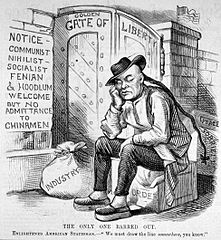Restrictionists frequently criticise unauthorised immigration by insisting on respect for the rule of the law. Dodging questions about the justness or reasonableness of immigration law, they continue to insist the law must be respected, independent of any concerns one might have about ethics or practicality. I wonder, then, if these same people have never illegally downloaded anything in their lives.
The parallels between intellectual property theft and immigration are rather interesting. As currently structured, both intellectual property and immigration laws are:
- Difficult to enforce
- Rarely consistently enforced except in extremely totalitarian states
- When enforced, enforced quite arbitrarily
- Considered unreasonable and/or unethical by many
- Routinely disregarded by many, both in the developed and developing worlds
All the arguments for rounding up all “illegal immigrants” in the world and deporting them, as well as “tightening” border controls, are equally applicable to intellectual property laws. Governments should more seriously pursue those who illegally download MP3s, books, games, and software. They should take strong punitive action to ensure previous offenders don’t enjoy the fruit of their offenses, and strong preventive action to ensure nobody can offend these laws again. Consider the enforcement parallels:
- Deport them all
- Wipe all their hard drives
- Build a wall
- Shut down every filesharing website, including YouTube, Facebook, Google, etc.
You may think I’m kidding, but these enforcement parallels exist: when my alma mater finds a student has been using their wireless internet to illegally download or share files, they make them bring in their computer for a scan to ensure all offending material has been deleted. Automated copyright enforcement schemes even took out NASA’s live video feed, when a false positive led YouTube to declare NASA’s live video had violated the copyright of Scripps Local News.
My personal views of intellectual property law are irrelevant to the parallels I’ve drawn here (though if you’re curious, it’s somewhat close to my view of immigration law: quite clearly inadequate and unjust, but some restrictions will remain administratively necessary for the foreseeable future). Whether you support or oppose the current intellectual property legal regime, the parallels are clear to see. What I want to know is, have restrictionists never downloaded something illegally? Never watched a video on YouTube that wasn’t the uploader’s to upload? Never viewed a webcomic or read a PDF that wasn’t the sharer’s to share?
If restrictionists take their own arguments about the rule of law seriously, they should scrupulously avoid benefiting from the flagrant violations of the law entailed by what we consider day-to-day usage of the internet. It doesn’t matter how unreasonable or unenforceable the law is — the law is the law. Sure, piracy isn’t physically stealing from anyone — and neither is crossing an imaginary line some people drew on a map, for that matter. Besides, it’s not like you’re giving up the job that can pull you out of poverty, or giving up all hope of living with your family — all you’re giving up are movies, TV shows, books, and music which you can and should be paying for already. If restrictionists defending the “rule of law” want to be taken seriously, they can start by showing us the way forward in respecting the world’s copyright laws.



